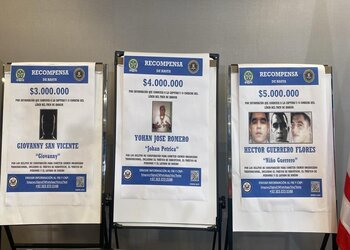The recent US designation of the Venezuelan gang Tren de Aragua as a transnational criminal organization puts the group on par with major security threats in Latin America and presents a new challenge to its so-far unstoppable regional expansion.
The Treasury Department’s Office of Foreign Assets Control (OFAC) announced on July 11 that it had placed Tren de Aragua on its list of transnational criminal organizations that threaten the stability of security in the Western Hemisphere.
“Today’s designation of Tren de Aragua as a significant Transnational Criminal Organization underscores the escalating threat it poses to American communities,” said Under Secretary for Terrorism and Financial Intelligence Brian Nelson.
The US State Department, together with the Colombian National Police, also announced rewards for information leading to the arrest of the main leaders and key figures of the Venezuelan gang. Up to $5 million is being offered for information leading to Hector Guerrero Flores, alias “Niño Guerrero“; up to $4 million for Yohan Jose Romero, known as “Johan Petrica“; and up to $3 million for Giovanny San Vicente, alias “Giovanny” or “El Viejo.”
The move by US authorities against Tren de Aragua and its leadership comes after Republican senators in March this year sent a request to President Joe Biden seeking the designation, despite the fact that the group appears to have a minimal and limited presence in the United States.
“If left unchecked, they will unleash an unprecedented reign of terror, mirroring the devastation it has already inflicted in communities throughout Central and South America, most prominently in Colombia, Chile, Ecuador, and Peru,” the lawmakers emphasized.
Tren de Aragua began as a prison gang within the walls of the Tocorón prison, in the state of Aragua in central Venezuela. From there, it built a center of operations that allowed it to expand, first nationally and then to other parts of Latin America.
Its regional growth coincided with the massive exodus of some 8 million Venezuelans who have sought refuge in different countries in the region, including the United States. The first official reports of the group’s growing international presence emerged in Colombia in 2018, a country that shares a border with Venezuela and is the first stop for most migrants.
InSight Crime Analysis
While Tren de Aragua’s new categorization positions it among the top security threats in the region, this new status also represents a strategic challenge for its leaders. They will need to adapt their expansion plans to a new and unprecedented level of scrutiny for the group.
The international growth of different factions of Tren de Aragua in Latin America over the last six years is one of the most remarkable criminal developments in recent times. From the walls of Tocorón, it went on to have a presence and illicit activities in countries including Colombia, Ecuador, Chile, Peru, and Bolivia, where its factions have managed to make inroads and dominate important criminal economies such as migrant smuggling, human trafficking, extortion, and small-scale drug trafficking.
In its first exploratory steps in the region, Tren de Aragua adopted a low profile and took advantage of migrant communities to go unnoticed. Likewise, a lack of knowledge on the part of local authorities facilitated its unfettered expansion across borders.
An example of the low profile of one of its leaders is Larry Álvarez Núñez, alias “Larry Changa,” who is considered the co-founder and a top leader of Tren de Aragua. In 2018, he managed to enter Chile through the airport with legal documents and without being subjected to any investigation by the authorities.
“When Tren de Aragua arrived in Chile it had a very low profile. … Larry Changa arrived here and set up a couple of businesses, bought a couple of vehicles, rented a couple of apartments without raising major suspicions,” Ignacio Castillo, the director of the organized crime unit of Chile’s Attorney General’s Office (Unidad Especializada en Crimen Organizado del Ministerio Público de Chile), told InSight Crime.
After being identified in 2022 by Chile’s security forces as one of the main leaders of Tren de Aragua, Changa fled to Colombia where he was captured by local authorities in early July 2024.
SEE ALSO: Three Stages in the Construction of Tren de Aragua’s Transnational Empire
With the new designation from the US Treasury Department, Tren de Aragua joins the list of the most notorious criminal organizations in Latin America and the world. The low profile it once maintained no longer exists to help it enter new countries under the radar.
One of the groups that went through a similar process was the Mara Salvatrucha (MS13), which was the first street gang designated as a transnational criminal organization in October 2012 by the US Treasury Department, mainly due to its violence in Guatemala, El Salvador, and Honduras, as well as its participation in a number of transnational criminal economies.
The designation cast a spotlight on the main leaders of the MS13, leading several of them to confront extradition requests and trials in the US justice system, which now promises to be the new scenario for the main leaders of Tren de Aragua.
Featured image: Posters signaling Tren de Aragua’s main leaders are shown during a press conference. Credit: Colombia’s National Police.

